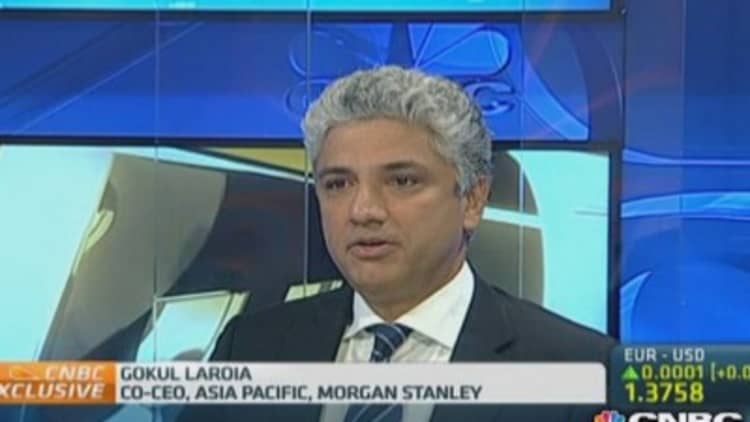Emerging markets have bounced back following last year's Federal-Reserve-induced taper tantrum, but with the U.S. central bank gradually shifting its focus to potential rate hikes are these markets at risk of another bout of capital flight?
Indonesia and India were among the worst-hit emerging markets last year after former Federal Reserve Chairman Ben Bernanke first broached the possibility of tapering the Fed's quantitative easing program a year ago. Indonesian stocks fell around 27 percent from their May peak to their August lows in 2013, while the Indian rupee tumbled to record lows against the U.S. dollar.
Read MoreCalls to scoop up emerging market assets grow louder
While both markets have since recovered as policymakers worked to correct macroeconomic imbalances – wide current account and fiscal deficits – and amid optimism around a change in political leadership, these markets remain hostage to Fed policy with potential near-term tightening moves likely to spark capital outflows.
However, while business leaders and policymakers say further capital outflows are to be expected when the Fed signals an imminent rate hike, the scale of will be smaller compared with May-September 2013.
"Like it or not, there will be a possibly of capital outflows because when the U.S. raises interest rates people will look for returns," Chatib Basri, Indonesia's finance minister told CNBC on the sidelines of the World Economic Forum in Manila on Thursday.
Higher U.S. interest rates typically lure investors to dollar-denominated assets as they are seen as more attractive than emerging market assets from a risk/reward perspective. The Fed is expected to begin hiking rates at some point in 2015.

"However, I don't believe the situation will be as bad as 2013," he said. Basri expects measures taken by the government and central bank to improve macroeconomic stability over the past year will help to temper outflows.
Bank Indonesia, for example, raised interest rates by 125 basis points last year to restore investor confidence in the rupiah and cut demand for expensive imports as the economy slowed.
Read MoreBlackBerry goes budget to reverse emerging market slump
The rupiah, which fell over 20 percent against the U.S. dollar last year, has recovered around 5 percent since the start of 2014.
Philippine Finance Secretary Cesar Purisima, meanwhile, said Fed tightening may trigger a knee-jerk rush of funds out of the country, but he expects it will be fairly short-lived.
"Not all emerging markets are alike. There are emerging market countries that are more dependent on international capital markets, and there are those that are not. In the case of the Philippines, we're less dependent, our growth has been driven domestically, our funding comes more from domestic sources than foreign sources. We're a structural current account surplus country."
"Therefore, while countries like the Philippines will be buffeted at the start of such a process ultimately the market will realize that all emerging markets aren't all the same," he added.
Read MorePimco's bad bets on emerging markets add to firm's troubles
Jaspal Bindra, chief executive officer, Asia at Standard Chartered agreed that any capital outflows induced by Fed tightening would likely be milder compared with 2013.
"I think last summer was a shock. This time around outflows will be better managed as emerging markets will be much more prepared; Indonesia has done well in its subsidies management, while [RBI governor] Rajan has been continuing his inflation targeting," he said.
"Also, a rate hike will hopefully come with an improvement in the U.S. economy, and that's a big savior for Asia given nations in the region export heavily to the U.S.," he said.
However, Victor Chu, chairman of Hong Kong-based investment group First Eastern Investment Group, noted the risk that a larger-than-anticipated rate hike could spark a more aggressive emerging market selloff.
"Nowadays, the central bankers give markets enough notice so a lot of it will be digested by investors unless the rate rise is substantially more or earlier than expected," he said.


